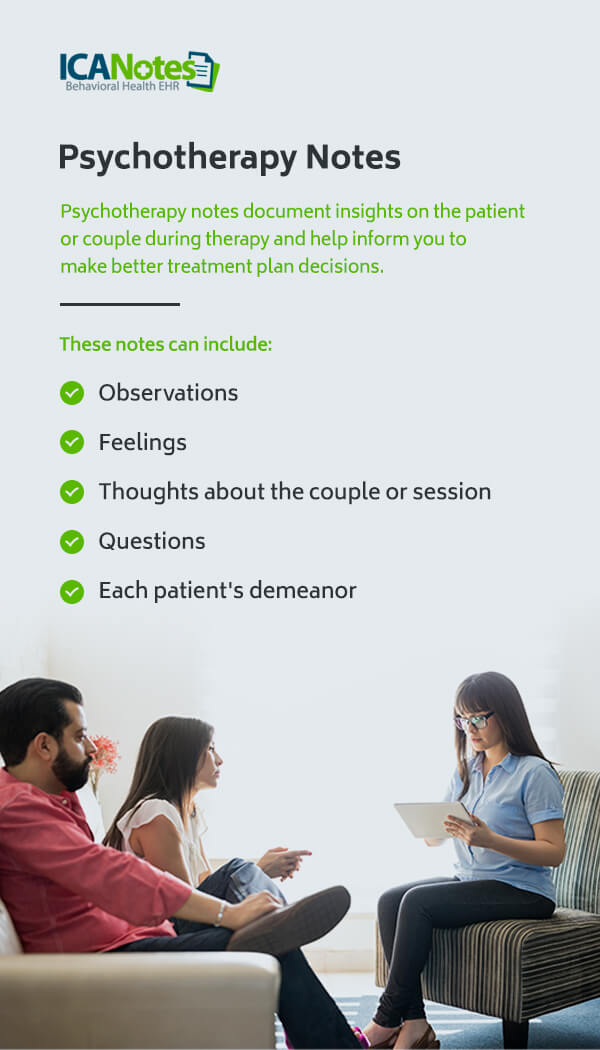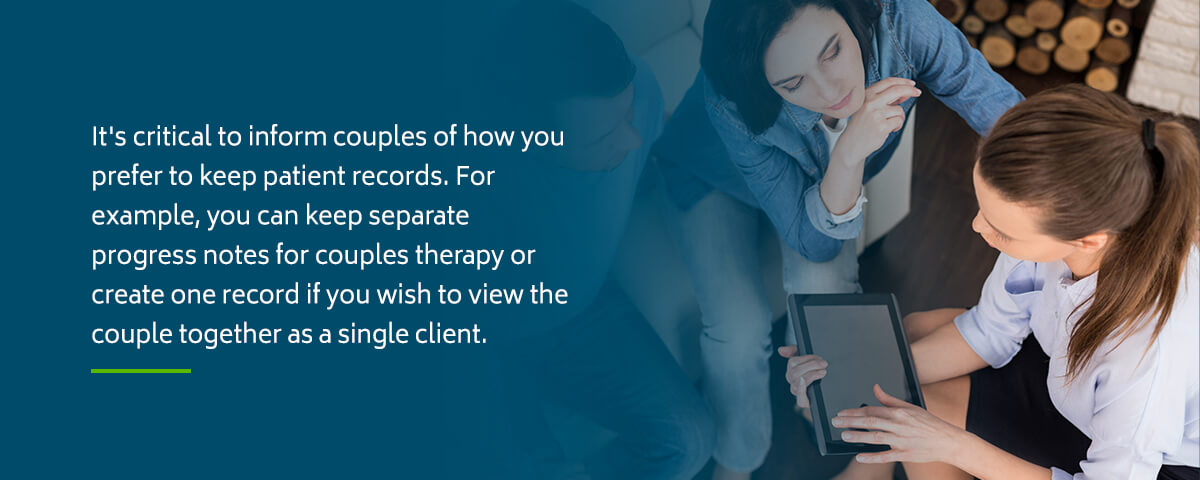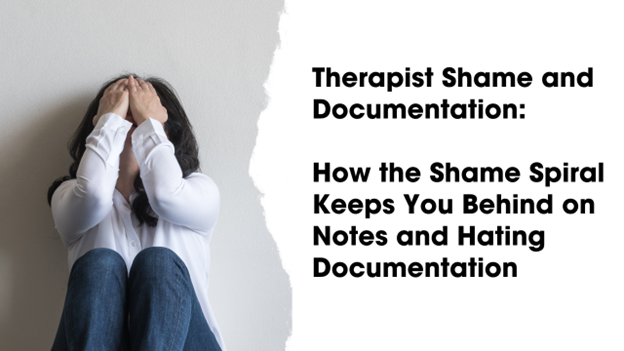How to Write Couples Therapy Notes
Couples counseling differs from individual therapy because instead of dealing with one person's issues or addiction, you're working through two individuals' needs and how those needs affect their relationship. While the clinical notes and paperwork for couples therapy are not wildly different from individual therapy documentation, there will be more interactions and personal challenges to work on than with one person.
When providing therapy to a couple, remember that each person has their own needs and ways of communicating with you and their partner during the session, which are some of the things you'll need to document. This article discusses how to write couples therapy notes, tips for personalizing them to your specific methods and how to use them to help you achieve your patient's goals.
Table of Contents
Download our Guide to Writing Better Couples Therapy Notes

Why Couples Go to Therapy
As with individual therapy, couples seek treatment for several reasons. Partners may turn to couples therapy to deal with a recurring issue in their relationship or to cope with a major event, such as disease, death of a loved one or pregnancy.
Regardless of the reason couples choose to go to therapy, it's often a huge step for each partner to agree they want to work on an individual or relationship issue together. Some of the issues couples may experience that lead them to try counseling include:
- Difficulty communicating or expressing feelings
- Trauma
- Problems with physical intimacy
- Infidelity
- Abuse or violence
- Loss of a child
- Lack of trust
- Problems with children
- Addiction
- Anxiety or depression
- Irreconcilable differences leading to divorce
- Financial struggles
- Issues with partners' relatives or friends
Many couples may decide to go to counseling after developing patterns of behavior, leading to circular arguments that continue without any resolution. Some partners may feel constantly blamed or ignored by the other and fail to see their own shortcomings. Couples therapy can help address many difficulties in relationships, from preventing finger-pointing and name-calling to building trust after one or both partners have been unfaithful.
The Goals of Couples Therapy
Because every couple chooses to go to therapy for different reasons, they will all have different hopes and expectations for their sessions. As a therapist, you may want to achieve several goals during their counseling, including:
- Repairing their relationship
- Identifying the root causes of their disputes
- Helping them understand their partner's point of view
- Developing trust with each partner without alienating one or the other
- Teaching them how their actions contribute to conflicts
- Providing them with an understanding of each person's struggles
- Setting boundaries in the session to help them feel safe to express their feelings and opinions
- Helping them use a more effective communication style
- Bringing closure to their past disputes
- Offering them ways to balance responsibilities and stress
- Finding personalized solutions for their ongoing problems or addictions
It's your job as a therapist to make both partners in the relationship feel equally heard and respected to set an example for the couple, help them achieve their goals and make your couples therapy sessions more productive. One partner may try to gain favor with you by blaming the other or talking over them to make certain you hear their side of the story. Be sure to let both partners know they must respect each other's time and remain neutral when discussing issues.
Both partners should be able to speak freely and without fear of judgment, bias or criticism. It's also a good idea to meet each partner separately as part of their first session to learn about sensitive issues and allow them to warm up to the idea of therapy without feeling judged by their partner. Try to avoid solving the problem for them, as this can cause one or both partners to feel defensive. By sharing new communication methods with them, you give them the resources they need to resolve their own issues during therapy and at home.
Download our List of Couples Therapy Interventions

Progress Notes vs Psychotherapy Notes
As a behavioral healthcare provider, you will know the vital role progress notes play in creating a treatment plan for individuals and couples across many different therapy methods. However, progress notes and psychotherapy notes are not interchangeable. Psychotherapy notes are professional documents containing important information focused exclusively on a patient's or couple's therapy sessions. Unlike progress notes, psychotherapy notes can only be written by therapists, counselors and mental health practitioners who are actively involved in the couples' therapy.
On the other hand, progress notes are professional documents that convey information about a patient's condition through therapy and may transfer between multiple providers.
Let's look at the specific definitions and differences between progress notes and psychotherapy notes.
Couples Therapy Progress Notes
The purpose of progress notes is to communicate information about the patient or couple and their treatment plans between behavioral health professionals, including:
- Medical history
- Session times
- Frequency of treatment
- Results of clinical assessments and tests
- Prescriptions
- Past treatments
- Current treatment plan information
- Current condition
- Diagnoses
- Progress to date
- Major events discussed
- Specific interventions provided
- Alternative treatments
- Homework assigned
You can share progress notes with your clients, insurance companies and billing parties, but they are still protected by privacy laws. You must sign and date every progress note and include your credentials. Keep in mind that progress notes should not include:
- Speculation
- Hypothesis
- Your personal feelings or judgments
- Any information, events or experiences that are not relevant to the session or treatment plan
- Identifying information about people not involved in the treatment
Couples Psychotherapy Notes
Psychotherapy notes document insights on the patient or couple during therapy and help inform you to make better treatment plan decisions. These notes can include:
- Observations
- Feelings
- Thoughts about the couple or session
- Questions
- Each patient's demeanor
Generally, psychotherapy notes are very detailed but should not contain medical or billing information. These notes are for you to reference when you create your progress notes and develop a treatment plan for each individual or the couple as a whole. Your psychotherapy notes should not include diagnoses, either partner's treatment history or individual or couple treatment plans.
Personalizing Couples Therapy Notes for Your Practice
As with all therapy notes, you can personalize your couples therapy notes to meet your — or their — needs and adjust them to your particular style so it's easier and more effective. After all, every couple is different, and your interactions and experience with them will be unique, so it's a good idea to customize your notes as needed.
Integrate Your Preferred Method
To help personalize your couples therapy notes, you can write down your favorite modalities. Whether you usually assign exercises with couples or have them review important principles of their relationship each session, adjusting your notes to your typical methods can make it easier to dive right in and make more efficient notes.
You might like to use the Gottman method, which focuses on managing conflict and negative interactions. Studies have shown that this method effectively handles serious problems in couples, including marital relationships, and helps them develop problem-solving skills.
As you work with more couples and gain more experience managing individual and relationship obstacles, you can modify your couples notes to a unique system that works for each couple's needs.
Recognize Patterns
If you notice a particular pattern with most couples, identify the steps you typically conduct in your sessions. For instance, what do you usually like to cover within your first three sessions? Do you focus on client confidentiality and honesty? There may be specific factors you like to discuss or ice-breaking exercises you want to conduct to help the couple feel more comfortable about opening up as the sessions progress.
Perhaps you prefer to have a set of constructed techniques during the first phase of treatment, or you put more emphasis on the exercises you assign at the end of your session. Whatever your preferred process, create a timeline of what couples counseling looks like with you and keep it handy for writing your couples therapy notes. This can make the process easier because it allows you to reference important things you may forget during your sessions.
Focus on Interaction
In individual therapy, you only need to focus on the relationship between you and your singular client. In couples therapy, there are more interactions to consider. You should focus on your interactions with each partner and between your two clients. These interactions are essential to note because they can help you determine if there are trust or boundary issues.
For instance, if you notice a pattern in how one partner speaks to another or how they seem less inclined to open up to you directly, you can write this down in your notes and reference it later to help adjust your treatment plan and tackle these obstacles.
In these notes, you can organize interactions by therapist or client actions and reactions. Note the methods you teach, assignments you make or any insights you give to the couple. Then, write down the couple's responses, the information they provide and how they interact with you and their partner after you speak. Structuring your notes this way can help you develop more effective progress.
Inform the Couple
Though the treatment and note-writing process for couples therapy aren't too different from individual counseling, there is a significant difference in confidentiality and record keeping. It's critical to inform couples of how you prefer to keep client records. For example, you can keep separate progress notes for couples therapy or create one record if you wish to view the couple together as a single client.
You can choose either option, but be sure to stick to the method once you decide on it. You want to inform couples of how you keep your records in case they should ever ask for copies. This lets them know ahead of time whether your charting, notes and billing process will be done individually or as a couple, so there are no surprises.
Tips for Writing Couples Therapy Notes
Now that you know some general recommendations for personalizing your notes, here are a few helpful tips you can use to ensure your couples therapy notes are accurate, effective and detailed.
- Refer to your previous notes to ensure appropriate progress and continuity.
- Note your specific observations, what they mean and how you and the couple plan to address them.
- Write about specific issues or relevant occurrences as soon as possible.
- Understand what information you need during the session to create an effective treatment plan.
- Avoid using abbreviations, slang or jargon that could confuse you or other providers.
- Keep your notes simple and only write the information you can effectively use.
- Avoid using terms like "always," "never," "good," "bad," or any words that suggest judgments or absolutes.
- Use correct spelling and grammar to make your notes easier to read.
- Keep your notes objective, concise, relevant and organized.
- Watch out for potential biases or misrepresentations of your patients.
- Include the couple's relationship and response to the treatment plan.
Sample Progress Notes for Couples Therapy
Remember that individual and couples therapy are different despite having similar goals in mind. In couples therapy, it's important to keep your notes organized and detailed enough so you can easily differentiate between each client and can clearly identify each of their personal obstacles if you keep it all within one record. If you keep the progress notes in separate records for each partner, be sure to make notes in each record about how the couple interacts and what interventions you plan for them as a couple in addition to their individual treatment, if needed.
In couples therapy, you will likely have to include many other factors and elements compared to when you work with one client. For instance, in couples counseling, once you receive a description of a problem or an event by partner A, you may also need to ask partner B how they feel about the explanation and if they agree or disagree with the characterization. Aside from the issues each partner may identify with the other, you will also have to discuss any obstacles the couple is facing together, such as financial decisions, family planning or a career change.
A few key components of your couples therapy notes will include:
- Relevant details for each partner
- Observations about each partner's mood and body language
- Notes about each partner's responses, participation and behavior
- Descriptions of significant events or problems between the couple
- Goals for each patient individually and as a couple
- Interventions you used to help the couple reach their goals
- Client feedback and suggestions about their treatment plan
To make your notes more detailed, you can use a mental health status exam checklist to guide you as you organize your observations. A helpful way to keep the different sections and criteria of your couples therapy notes clear and concise is to utilize software that includes templates and sample progress notes for couples therapy, which include:
- Behavior
- Content of therapy
- Intervention
- Diagnoses
- Treatment plan details
ICANotes Can Help You Document Your Couples Therapy Notes
Keeping your notes relevant, detailed, and organized is critical for saving time and energy as you write your notes. Using these effective note strategies during couples therapy can allow you to spend more time with your clients and less time referencing notes to develop your treatment plans. Whether you want to keep your couples therapy notes together or separate, using a leading electronic health record software like ICANotes will empower you to take these strategies from idea to implementation.
Our behavioral health platform allows couples therapists and mental health providers to speed up their clinical documentation processes efficiently and accurately and reduce the frustration associated with long turnaround times. To help take your progress notes to the next level, start your free trial today or schedule a live demo to see how ICANotes can help your private practice. We also invite you to contact us if you have any questions.















